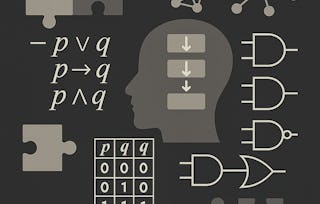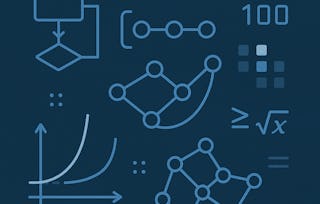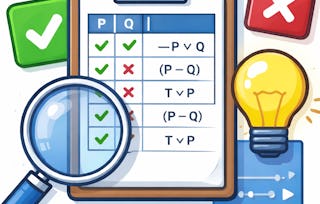Unlock the power of logical thinking and formal reasoning essential for success in computer science, data analysis, and software development with this dynamic course. Ideal for students, software engineers, data scientists, and IT professionals, this comprehensive program delves into logic foundations critical for advanced computing careers.

Logic for Computer Science

Logic for Computer Science
This course is part of Mathematics for Engineering Specialization

Instructor: BITS Pilani Instructors Group
Included with
Recommended experience
What you'll learn
Analyse computational problems to identify appropriate proof techniques and logical reasoning methods that best address their complexities.
Design comprehensive solutions to algorithm development challenges by synthesising and applying principles of propositional and predicate logic.
Evaluate system reliability by conducting model checking using temporal logics, and interpret the results to ensure system correctness.
Construct formal verification plans for algorithms and programs using Floyd-Hoare logics and justify their correctness through logical reasoning.
Skills you'll gain
- Computational Logic
- Systems Analysis
- Algorithms
- Theoretical Computer Science
- Deductive Reasoning
- Programming Principles
- Software Development
- Machine Learning
- Verification And Validation
- Computer Science
- Analytical Skills
- Data Analysis
- Computer Programming
- Logical Reasoning
- Skills section collapsed. Showing 9 of 14 skills.
Details to know

Add to your LinkedIn profile
113 assignments
See how employees at top companies are mastering in-demand skills

Build your subject-matter expertise
- Learn new concepts from industry experts
- Gain a foundational understanding of a subject or tool
- Develop job-relevant skills with hands-on projects
- Earn a shareable career certificate

There are 10 modules in this course
In this module, you will learn the relevance of formal logics in computer science. You will understand the difference between syntax and semantics. The module will also introduce you to propositional logic and informally to its syntactic constructs.
What's included
10 videos4 readings8 assignments
In this module, you will learn about the symbolic manipulation technique of natural deduction. The module will also discuss the different rules of natural deduction with examples.
What's included
12 videos3 readings11 assignments
In this module, you will learn about state-of-the-art methods of resolution and Davis-Putnam-Logemann-Loveland (DPLL) methods to argue about the satisfiability of a propositional logic formula. We study the relevant characteristics of a logical theory, i.e., the consistency, soundness, and completeness, and comment on natural deduction as a proof technique on how it scores over these characteristics.
What's included
14 videos3 readings13 assignments
In this module, you will be introduced to model-based formal verification techniques, in particular, the model checking techniques. The module will informally discuss two popular families of temporal logics: linear temporal logic (LTL) and computation tree logic (CTL).
What's included
13 videos4 readings12 assignments
In this module, you will formally learn the LTL and CTL temporal logics. The module will also introduce you to the algorithms used for model checking over these algorithms. The module will further explain fundamental system properties, such as invariance, safety, and liveliness. Furthermore, the module will give provide you insight into how to encode natural language sentences into LTL and CTL formulas.
What's included
13 videos5 readings12 assignments
In this module, you will learn the need for predicate logic and how to express statements in predicate logic. You will also learn about the syntax of predicate logic and the fundamentals behind writing proofs in predicate logic. You would also learn the concept of substitution and the difference between the free variables and bound variables. You will also get introduced to basic predicate logic rules that are used for proving sequents.
What's included
23 videos4 readings22 assignments
In this module, you will learn to apply the proof rules of natural deduction to prove sequents in predicate logic. The proof rules that you would learn include: Universal Quantifier Elimination, Existential Quantifier Introduction, Universal Quantifier Introduction and Existential Quantifier Elimination. You would also learn to identify which specific rules to apply for writing proof of a given sequent.
What's included
17 videos3 readings5 assignments
In this module, you will learn about semantics and model interpretations in predicate logic. You would also learn about the satisfiability and validity of predicate logic formulas, along with the undecidability of validity. You would also learn about the limitations of first-order predicate logic and how second-order predicate logic is useful in such cases.
What's included
20 videos4 readings19 assignments
In this module, you will learn how to formally verify programs written in imperative style. More specifically, you will learn formal methods to verify assignment statements, sequence of statements, conditional statements, and iterative statements. You will also learn the formal method to verify whether a given program terminates or not.
What's included
16 videos5 readings10 assignments
In this module, you will learn to prove the total correctness of various commonly used algorithms such as computing the power of two numbers, finding an element from an unsorted array, and selection sort. You would also learn to deduce loop invariants for programs of the above computational problems and prove that these programs terminates.
What's included
11 videos3 readings1 assignment
Earn a career certificate
Add this credential to your LinkedIn profile, resume, or CV. Share it on social media and in your performance review.
Instructor

Explore more from Algorithms
 Status: Preview
Status: PreviewUniversity of Leeds
 Status: Free Trial
Status: Free TrialUniversity of London
 Status: Free Trial
Status: Free TrialUniversity of London
 Status: Free Trial
Status: Free TrialThe Hong Kong University of Science and Technology
Why people choose Coursera for their career

Felipe M.

Jennifer J.

Larry W.

Chaitanya A.

Open new doors with Coursera Plus
Unlimited access to 10,000+ world-class courses, hands-on projects, and job-ready certificate programs - all included in your subscription
Advance your career with an online degree
Earn a degree from world-class universities - 100% online
Join over 3,400 global companies that choose Coursera for Business
Upskill your employees to excel in the digital economy
Frequently asked questions
To access the course materials, assignments and to earn a Certificate, you will need to purchase the Certificate experience when you enroll in a course. You can try a Free Trial instead, or apply for Financial Aid. The course may offer 'Full Course, No Certificate' instead. This option lets you see all course materials, submit required assessments, and get a final grade. This also means that you will not be able to purchase a Certificate experience.
When you enroll in the course, you get access to all of the courses in the Specialization, and you earn a certificate when you complete the work. Your electronic Certificate will be added to your Accomplishments page - from there, you can print your Certificate or add it to your LinkedIn profile.
Yes. In select learning programs, you can apply for financial aid or a scholarship if you can’t afford the enrollment fee. If fin aid or scholarship is available for your learning program selection, you’ll find a link to apply on the description page.
More questions
Financial aid available,

